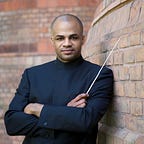In Orchestral Programming, the Carpet Must Match the Drapes
In light of classical music’s Black Lives Matter movement, orchestras must now hire Black conductors for programs with Black composers.
At this point in classical music’s Black Lives Matter movement, the carpet must match the drapes when programming Black composers.
US orchestras could stand to learn from superstar Black director Ava DuVernay. She makes sure the director, writer, and/or creator is representative of the story’s culture.
Instead of seizing the BLM movement to grant Black conductors central cultural membership to the genre and eschew institutionalized racism, US orchestras continue to program Black (culture) composers (writers) with white conductors (directors).
The carpet doesn’t match the drapes.
If there’s a stitch of Black on the program, a Black conductor should be hired for the entire program, and yes, this means the dead old white ones too. Continuing to engage white conductors to lead Black composers is racist. Orchestras must now recognize and redress their first degree systematic racist exclusion of Blacks from the podium, the inequity in white conductors always having the freedom to conduct all of everything, and that only whites decide who’s deserving of a musical career.
Engaging white conductors to conduct Black composers persists that music from Black hands can’t be trusted in Black hands.
Programing Black composers is an opportunity to finally create racial inclusion on the podium. Orchestras rarely perform composers of the African diaspora. When they do, we’re expected to be proud they merely let Blackness in the air, much less the room. Having your white music director conduct an all-Black program maintains racial exclusion, and increases the implicit racial bias that Black conductors can’t hack it.
Orchestras aren’t willing to fully invest in Black podium art. This is in part why there has never been a Black conductor of a major US orchestra. The conductor often requires the largest nightly financial investment on stage. On top of artist fees, guest conducting involves being flown in and lodged. We’re just not worth it to them. Presenters believe Blacks should be grateful for the mere opportunity to stand on stage. It’s an industry wide open secret that Black conductors are paid significantly less than similarly situated white conductors, and yes, I have receipts.
Audiences, administrations, and musicians learn implicitly from our absence that Blacks can’t even be trusted with our own cultural repertoire, we’re not worthy of white spaces, we don’t belong on stage, and that we’re inferior to whites. Our intentional exclusion helps fulfill the racist trope that Blacks are inferior arbiters of Western classical music.
This is all false.
More than ever, orchestras need to build trust with their Black community, and ensure future Black audiences, stakeholders and artists. Many orchestras were failing pre-Covid 19. So why do they perpetuate the same institutionalized racism that has financially crippled them and shuttered so many of their doors for 2020? Why do orchestras ignore classical music’s Black Lives Matter movement ?
The white imagination of a violent Black “other” contributes to our marginalization on the podium. Whites see the Black body as a high caliber weapon. The presence of Blackness in white space makes them uncomfortable, compromising the racial equilibrium. Our presence also reminds them of their whiteness, making them feel guilty as our oppressors.
Orchestras would rather go bankrupt than let unbridled Blackness on the podium.
Rather than going for the cultural add, they go for the cultural fit. They hire conductors most like themselves — typically White, Asian or Latinx (lower caliber weapons) — , all with significantly more white privilege and closer proximity to the center of society.
When Black conductors arrive on the podium, we’re forced to conduct an unwelcome self. Orchestras are trained to believe that only white bodies are capable of musical transcendence. An incestual cycle of guest conductors/artists with the same or similar cultural repertoires and narratives is spunout weekly. Their Black communities feel left out, and that the orchestral experience isn’t for them.
It isn’t.
Unable to represent and reflect the needs of their Black communities, orchestras struggle financially, then throw temper tantrum strikes when cash runs low. Instead of throwing tantrums, orchestras should be asking how have they represented, supported, endeared trust with, and given full artistic equity to the lowest common denominator in their communities. Blacks.
Will they learn to socialize with Blacks in time to save classical music?
I think not.
Liked this story? Buy me a coffee! Ko-fi.com/maestrobkb
Brandon Keith Brown is a laureate and the audience favorite of the 2012 International Sir Georg Solti Competition for Conductors, and guest conducts prominent European orchestras including the Konzerthaus Orchestra Berlin, Rundfunk Sinfonieorchester-Berlin, Badisches Staatskapelle, Staatskapelle Weimar, members of the Vienna Philharmonic, Cape Town Philharmonic, and the Jena Philharmonie among others.
As an educator and activist, Brown seeks to engineer society from the podium by decreasing the racial stigmatization of Black classical musicians. He is a noted public speaker, writer and equity consultant. TV appearances include Deutsche Welle’s Racism: How to Hear the Hurt, and WDR on white supremacy in classical music. Interviews include NPR’s Here and Now, DIE ZEIT and Deutschlandfunk. His writing is featured on Deutschlandfunk Kultur, The Medium and in the Berlin Tagesspiegel. He has lectured at Humboldt University, the University of Art and Music in Berlin, and is a frequent podcast guest, speaker and advisor on racism.
For engagements: info@brandonkeithbrown.com
Website: www.brandonkeithbrown.com
Instagram: @brandonkeithbrownconductor
